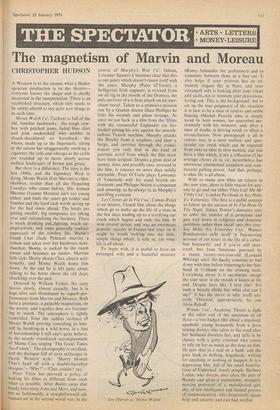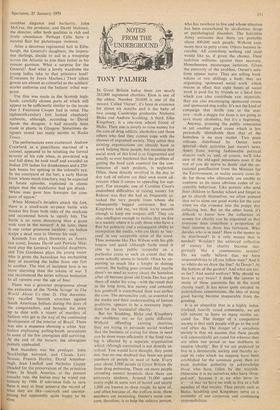• ARTS • LETTERS • MONEY• LEISURE
The magnetism of Marvin and Moreau
CHRISTOPHER HUDSON
A Western is to the cinema what a Shake- spearian production is to the theatre— everyone knows the shape and is chiefly interested in the interpretation. There is an established structure, which only needs to be subtly altered to say quite new things to us each time.
Monte Walsh (`A', Carlton) is full of the old, familiar landmarks: the tough cow- boy with patched jeans, faded blue shirt and pink neckerchief who ambles in slouch-shouldered on horseback; the whore, made up to the fingernails, sitting at the saloon bar exaggeratedly smoking a cigarette; the yells and whoops as the cattle arc rounded up to move slowly across endless landscapes of brown and green.
But there is a difference. Thc time is the late 1880s, and the legendary West is dying. Monte Walsh (Lee Marvin) is older, shabbier, tireder than all the Hopalong Cassidys who came before. His woman Martine (Jeanne Moreau) isn't too young either, and finds the years get colder and lonelier and the hard cash worth saving up for the bad times ahead. The herds arc getting smaller; big companies arc taking over and rationalising the business. There is much drinking and fighting, much un- employment, and some generally realistic appraisals of the cowboy life. Walsh's friend Chet (Jack Palancc) marries a widow and takes over her hardware store. Another, Shorty, is sacked by the ranch owner and becomes an outlaw. Martine falls sick; Shorty shoots Chet, almost acci- dentally. and Monte Walsh hunts him down. At the end he is left quite alone, talking to his horse about the old days, chuckling over the past.
Directed by William Fraker, the story moves slowly, almost casually, but it is kept alive and illuminated by superb per- formances from Marvin and Moreau. Both have a presence, a palpable magnetism, on . the screen; and together they are fascinat- ing to watch. The atmosphere is tightly controlled, from the sudden violence of Monte Walsh proving something to him- self by breaking-in a wild horse. in a feat of horsemanship I still can't quite believe, to the moody soundtrack accompaniment of Mama Cass singing The Good Times Are Comin'.' The photography is excellent, and the dialogue full of terse exchanges in classic Western style: 'Shorty blowed Chet's head off with a double-barrelled shotgun.'—`Wiry?'—`Chet couldn't say.'
Peter Yates has pursued a policy of making his films as different from each other as possible. After Bullitt came that trendy love-story Jo/in and Mary. and now, not so fashionably, a straightforward ad- venture set in the second world war. In the course of Murphy's War (`A', Odeon, Leicester Square) it becomes clear that this is one genre which doesn't renew itself with the years. Murphy (Peter O'Toole), a belligerent Irish engineer, is rescued from an oil rig in the mouth of the Orinoco, the only survivor of a u-boat attack on his mer- chant vessel. Taken to a primitive mission run by a Quaker doctor (Sian Phillips) he licks his wounds and plans revenge. At once we are back in a film from the 'fifties with the resourceful Englander (or Ire- lander) pitting his wits against the smooth, callous Teuton machine. Murphy attacks the Bosche from .a seaplane, and later a barge, and survives through the coinci- dences you only find in the kind of patriotic novel from which the film must have been scripted. Despite a great deal of money, time, and possibly care, invested in the film, it remains no more than mildly enjoyable. Peter O'Toole plays Lawrence of Venezuela with his usual boyish en- thusiasm; and Philippe Noiret is competent and amusing. as he always is, as Murphy's unwilling assistant.
Les Choses de la Vie (`AA', Cameo-Poly) is an intense, French film about the things which go to make up the life of a man in the few days leading up to a terrifying car crash which begins and ends the film. It won several prizes, and was an enormous popular success in France last year. so it might be worth looking into the little. simple things which, it tells us, arc what life is all about.
To begin with, it is useful to have an estranged wife and a beautiful mistress Lee Marvin as 'Monte Walsh'
(Romy Schneider for preference) and to commute between them in a fast car. It also helps if your mistress has an ex- tremely elegant flat in Paris, and your estranged wife is looking after your island and yacht, not to mention your precocious, loving son. This is the background; but to set up the true poignancy of the situation it is best to be- a man of reserve and noble bearing (Michel Piccoli) who is deeply loved by both women, has quarrelled pas- sionately with his mistress, and, after a time of doubt, is driving south to effect a reconciliation. Now photograph it all in colour, toss in a most realistic and spec- tacular car crash which can be repeated from time to time in slow motion, and you have a film which, if not a reflection of the average closes de la vie, nevertheless has enormous sentimental attraction and com- mercial pulling power. And that. perhaps, is what life is all about.
With so many new films on release in the new year, there is little reason for any- one to go and see either They.Call Me Mr Tibbs ('AA', London Pavilion) or Say Hello To Yesterday. The first is a pallid attempt to follow up the success of In 7'he Heat Of 7'he Night. Sidney Poitier's detective tries to solve the murder of a prostitute and gets tied down in religious and domestic problems rather than racial ones this time Say Hello To Yesterday (`AA', Warner Rendezvous) calls itself 'a fast-moving account of ten hours in the life of a subur- ban housewife' and if you're still inter- ested. has Jean Simmons pursued by a manic twenty-two-year-old (Leonard Whiting) until she finally consents to bed down with him before returning to her hus- band in Cobham on the evening train. Everything about it is saccharine except the sour taste in the mouth it leaves at the end. Despite lines like 'I love you! It's such a bloody cliché but what else can 1 say?' it has the nerve to take itself seri- ously. Directed, appropriately, by one Alvin Rakoff.
Wanda ('AA', Academy Three) is right at the other end of the spectrum to all these—a low-budget film about a deprived. apathetic young housewife from a poor mining district who takes to the road after her husband divorces her, and falls in by chance with a petty criminal who comes to rely on her as much as she does on him. He gets shot in a raid on a bank, and she goes back to drifting. hopelessly, waiting for anything or nothing to happen. It is a depressing film, full of the small humilia- tions of frightened. lonely people. Barbara Loden, who directs, also takes the part of Wanda and gives a naturalistic, strangely moving portrayal .of a maladjusted girl. shy, of low intelligence and limited powers of communication. who desperately needs help and security and can find neither.
combine elegance and barbarity. John McCrae, the producer, and David Maloney, the director, offer both qualities in rich and lively abundance. Perhaps Celts have a natural flair for picturesque violence.
After a decorous regimental ball in Edin- burgh, the General's daughters, the impetu- ous darlings, decide to sail in a troopship across the Atlantic to join their father in his remote garrison. What a surprise for the General! And what a lovely wardrobe the young ladies take to that primitive land! (Costumes by Joyce Machen.) Their silken gowns are almost as colourful as the soldiers' scarlet uniforms and the Indians' tribal war- paint.
The film was made in the Scottish high- lands, carefully chosen parts of which still appear to be sufficiently similar to the locale that J. Fenimore Cooper had in mind. The eighteenth-century fort looked absolutely authentic, although, according to David Spode the designer, it had recently been made in plastic in Glasgow. Sometimes de- signers reveal too many secrets in Radio Times.
The performances were exuberant. Andrew Crawford, as a punctilious martinet of a colonel, appeared to be relishing the formal severity of his role when, in powdered wig and full dress, he took snuff and awarded an Indian 250 lashes for drunkenness and a 250- lash bonus for spitting in the colonel's eye. In the courtyard of the fort, a surly Huron from whom much treachery may be expected in future episodes, explained in classic pidgin that the malefactor had got drunk : 'White man gave him firewater for com- pany of squaw.'
When Montcal's invaders attack the fort, there is a small-scale set-piece battle with musket fire from both sides of the stockade and occasional howls to signify hits. The battle is no more distressing than a game with toys in the nursery. A bit later, there is one rather gruesome incident : an Indian scalps a dead man to liberate his soul.
Kenneth Ives plays Hawkeye, an Ameri- can scout; Joanna David and Patricia May- nard play the General's beautiful daughters, and Tim Goodman plays the young major who is given the hazardous but enchanting duty of escorting the ladies from one fort to another. The hint of incipient love is no more alarming than the tokens of war. I can recommend the series without hesitation to all viewers over the age of four.
There was a grimmer programme about the extinction of the 'Noble Savage' in The World About Us (Buc 2). This documen- tary recalled Spanish atrocities against South American Indians during the days of the conquistadors, and brought the story up to date with a report of murders of Indians who get in the way of the continuing development of the interior of Brazil. There Was also a sequence showing a white Aus- tralian explaining polling-booth procedures to some of the few aborigines still surviving. At the end of the lecture, the aborigines politely applauded.
Bob Saunders was the produper. John Stockbridge narrated, and Claude .Levi- Strauss, Francis Huxley, David Attenbor- nugh, Jean Liedloff and Nicholas Guppy Pleaded for the preservation of the primitive tribes. In South America, at the present casualty rate, the Indian may be wiped out entirely by 1980. If television fails to save them it may at least preserve the record of what they are like—uncouth and unenter- Prising but apparently quite happy to be






































 Previous page
Previous page